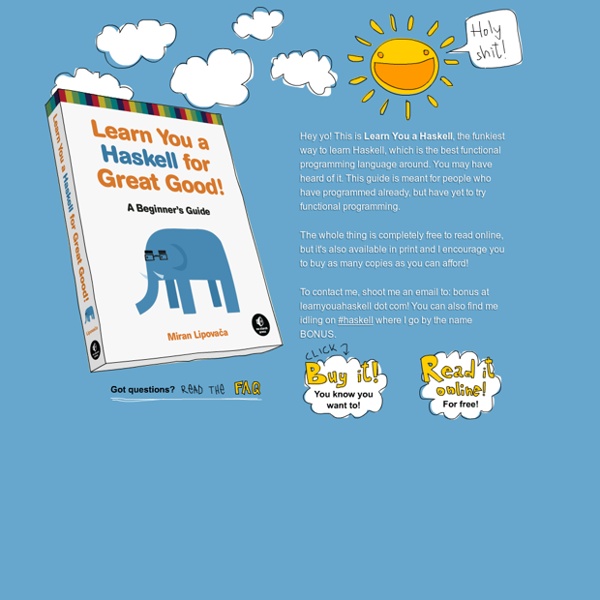



mode for Emacs There are many Emacs packages and modules for Haskell. The most prominent ones are haskell-mode, ghc-mod and Scion. 1 Newbie guide Emacs is an extensible texteditor which can be extended with so-called "modes" and makes great use of keystrokes. Modes are written in Emacs Lisp (.el) programming language and provide additional commands and keystrokes.
Introduction Haskell is a computer programming language. In particular, it is a polymorphically statically typed, lazy, purely functional language, quite different from most other programming languages. The language is named for Haskell Brooks Curry, whose work in mathematical logic serves as a foundation for functional languages. Haskell is based on the lambda calculus, hence the lambda we use as a logo. 1 Why use Haskell? Writing large software systems that work is difficult and expensive.
One Day, We Will All Be Programmers I probably spend more time than I should thinking about the economy. When I do, I often think about what it is most residents of the West do for a living, which I like to call the “economic profile” of the West. (Others call this employment by sector.) I think about how that profile has changed in the last hundred or so years, and about how it might change in my lifetime. Courses and Tutorials - Machine Learning Resources From Machine Learning Resources *Dr. Tom Mitchell, CMU : *Dr. Chris Atkinson, CMU (Old Link) : [1] *Dr. Jude Shavlik, University of Wisconsin: *Dr.
Hoogle - st lib Hoogle is a Haskell API search engine, which allows you to search many standard Haskell libraries by either function name, or by approximate type signature. Example searches: map (a -> b) -> [a] -> [b] Ord a => [a] -> [a] Data.Map.insert Enter your own search at the top of the page. Introduction - Learn You a Haskell for Great Good! About this tutorial Welcome to Learn You a Haskell for Great Good! If you're reading this, chances are you want to learn Haskell. Why I love Lisp This post was extracted from a small talk I gave at Simplificator, where I work, titled “Why I love Smalltalk and Lisp”. There’s another post titled “Why I love Smalltalk” published before this one. Desert by Guilherme Jófili Lisp is an old language. Very old. Today there are many Lisps and no single language is called Lisp today.
4.12. Using shared libraries On some platforms GHC supports building Haskell code into shared libraries. Shared libraries are also sometimes known as dynamic libraries, in particular on Windows they are referred to as dynamic link libraries (DLLs). Shared libraries allow a single instance of some pre-compiled code to be shared between several programs. In contrast, with static linking the code is copied into each program. Using shared libraries can thus save disk space.
-= Perlis Languages =- Perlis Languages this is another entry in a series on programmer enrichment A language that doesn’t affect the way you think about programming is not worth knowing. — Alan Perlis C9 Lectures: Dr. Erik Meijer - Functional Programming Fundamentals, Chapter 1 of 13 Welcome to a new technical series on Channel 9 folded into a different kind of 9 format: C9 Lectures. These are what you think they are, lectures. They are not conversational in nature (like most of what you're used to on 9), but rather these pieces are entirely focused on education, coming to you in the form of a series of high quality technical lectures (1 or more per topic) on a single topic. We kick off C9 Lectures with a journey into the world of Functional Programming with functional language purist and high priest of the lambda calculus, Dr. Erik Meijer (you can thank Erik for many of the functional constructs that have shown up in languages like C# and VB.NET. When you use LINQ, thank Erik in addition to Anders).
Scala Actors are Just Code - No Magic Dear Junior First time I tried out actors in Scala I though: "OK, there is a fair amount of magic going on here". I have later realised that there is actually no magic at all involved, but I would like to share with you my misconception and how it cleared out. Neil Mitchell - HLint HLint (formerly Dr. Haskell) reads Haskell programs and suggests changes that hopefully make them easier to read. HLint also makes it easy to disable unwanted suggestions, and to add your own custom suggestions. Running the tool over the darcs source code, we can generate an interactive report with --report, or view the results in the console: $ hlint darcs-2.1.2 CommandLine.lhs:49:1: Warning, eta reduce Found: quotedArg ftable = between (char '"') (char '"') $ quoteContent ftable Why not: quotedArg = between (char '"') (char '"') . quoteContent CommandLine.lhs:94:1: Error, use concatMap Found: concat $ map escapeC s Why not: concatMap escapeC s Ssh.hs:155:17: Error, use isPrefixOf Found: take 1 path == "~" Why not: "~" `isPrefixOf` path ... many other suggestions ... HLint can only be compiled by GHC 6.10.1 or above (it makes use of view patterns), but does not require any copy of GHC to run.
How to fix your project collaboration model? « bertrand’s brain grep I’ve been studying the collaboration processes of the Apache Software Foundation (ASF) for a while [1], by observing and practicing the successful collaboration model that we use in ASF projects. Taking the opposite angle, I’ve been reflecting lately on how to fix a broken collaboration model. How do you help teams move from an “I have no idea what my colleagues are doing, and I get way too much email” model to the efficient self-service information flow that we see in ASF and other open source projects? As I see it, the success of the Apache collaboration model is based on six guiding principles: